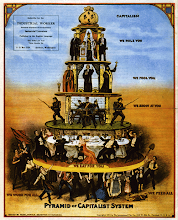skip to main |
skip to sidebar
Recommended Web Read, Review of "Why Marx Was Right" and "Lenin"
As it turns out Owen Hatherley writing in the Guardian agrees and disagrees with my first part review of Eagleton's Why Marx Was Right. On whether the objections to Marx's thought in the opening of the chapter are straw-man objections, I think they are, but he doesn't. I concede that not all these objections are total straw-men. Marx was a complex thinker, and so these points are debatable. On the other hand he does point out the truth that it is absurd to think that Marx was a proponent of authoritarianism and against democracy. Finally, he also notes the same primary weakness of Eagleton's book, that is the lack of explication and defense of Marxist economics:
One virtue of this book is how believable, and in a sense how serious, these opening denunciations are. These are not the arguments of straw men, but substantial intellectual and political objections: Marxism imposes limits on human freedom; it is violent and undemocratic; it is obsessed with an obsolete notion of class; it is "totalising" and conceited in its sense of historical inevitability; and, when tested politically, it resulted in one of the greatest tyrannies in history. Eagleton deflects these through excursions into philosophy, political practice and literary analogy.
He owns up to the accusation of Marx's belief in historical inevitability, but points out that few Marxists now subscribe to it. With reference to theEconomic and Philosophical Manuscripts of 1844, the idea of Marx as an opponent of liberty is easily dismantled; and an account of his political practice and advocacy of the ultra-democratic Paris Commune makes nonsense of the common misreading of the phrase "dictatorship of the proletariat". In the most polemically charged and enjoyable sections of the book, Eagleton points out that the "working class" – both in the sense of those without property, who are forced to sell their labour, and in the sense of those working in factories mass-producing goods – is far larger than it was in Marx's time, and is growing worldwide; he also soundly ridicules the contemporary cliché of class as a sort of ethnicity (as in the pernicious phrase "white working class").
Yet economics is largely absent. Most posers of the question "Was Marx right?" have focused on his claim that capitalism is inherently prone to crisis, and guiltily replied: "Yes." Yet Eagleton largely avoids the critique of political economy, assuming that he already has the reader's agreement.
Owen Hatherley also reviews another book by Lars T Lih, "Lenin" a biography and defense of Lenin that also debunk some of the received wisdom from even some misguided Marxist sympathizers who wish to lay the blame for the failures of the Soviet Union and also the boorish sectarian behavior of Western Marxist-Leninist parties at the feet of Lenin himself.
His Lenin is not the secular saint that old-school communists and sentimental Trots take him to be, nor the bloodthirsty monster of the liberal, anarchist and conservative imagination. In fact, Lih gives practically all recent accounts of the man's life and work extremely short shrift. His account denies that Lenin's thought and practice entailed "a worry about workers", encapsulated in his alleged conception of an elite, centralised party raised above the masses. He argues, with an assured command of his sources, that Lenin was an incorrigible optimist about working-class organisation: his overarching aim was to encourage it through education, agitation and exemplary, heroic action, rather than acting on the workers' behalf. So in 1917, the socialist revolution was justified not so much by the teleology of history as by the – fairly indisputable – fact that the workers of St Petersburg and Moscow wanted it. That the Russian workers' "heroic" (a word often used by Lih's Lenin) act didn't inspire a successful Europe-wide revolution left Lenin and the Bolshevik regime looking "like a cartoon character who keeps walking in mid-air even though he has left the cliff behind".
This view is also in agreement with the views of Moshe Lewin's the Soviet Century which I am presently reading. Lih's book sounds well worth reading as well. It also appears that like Eagleton, Lih doesn't ideologically shirk from the negatives of Lenin, but attempts to lead the reader to appreciate the historical context of Lenin's policies.




No comments:
Post a Comment